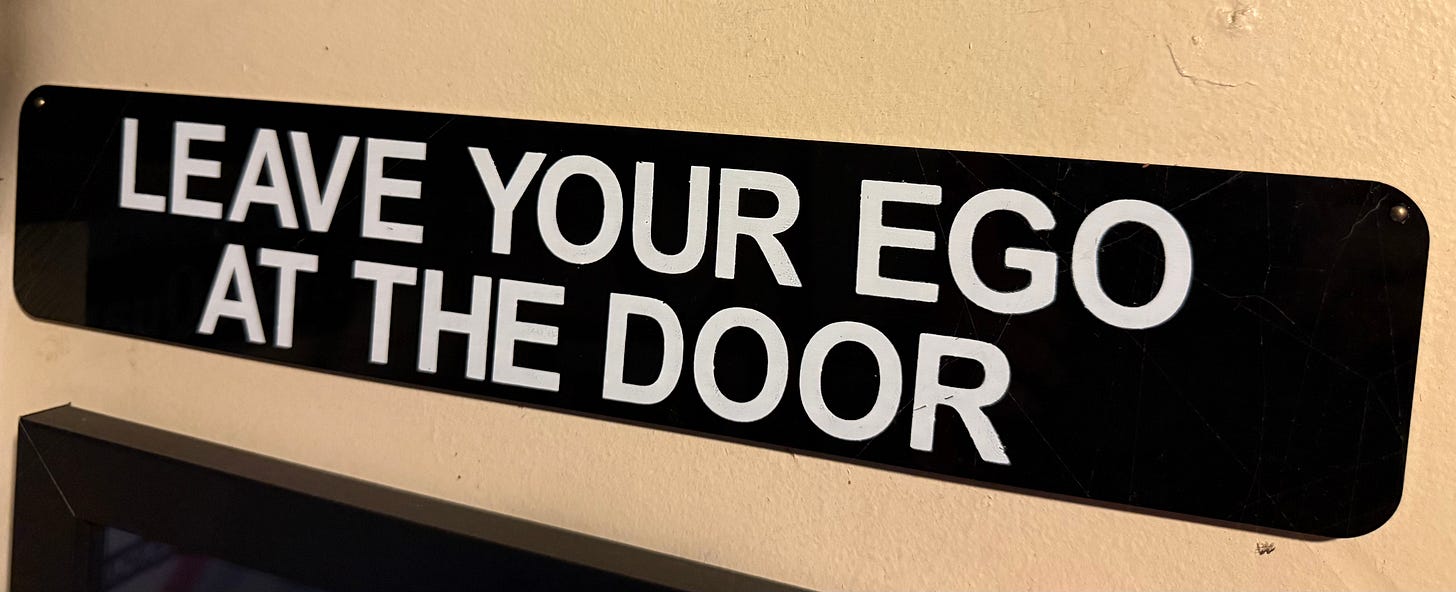I used to think being a great manager meant having the sharpest answer, the quickest decision, and a rousing Braveheart speech at the ready. (My inner Frenchman applauded; my inner Scot checked the budget.) It worked—up to a point. I even had a sign to remind myself to not be the biggest ego in the room. “Leave your ego at the door” it says. Like why did I need a reminder in the first place. Live, leave and learn.
Then I noticed something subtle but deadly: people stopped telling me bad news early. Ideas came pre-sanded and safe. Velocity dipped, not dramatically, but like a soufflé losing lift. My team wasn’t lazy; they were checking out.
Here’s the uncomfortable truth I learned the hard way: ego will get you promoted through the early rungs, but it quietly caps your team’s output at ~50–60% of what they could deliver. Lower ego—expressed as humility, psychological safety, and genuine credit-sharing—unlocks the extra 40–150% you need when it truly matters. In crunch moments, a benevolent leader can summon what feels like 200% effort—not by demanding it, but because the team wants to give it.
“low-ego” leadership outperforms
1) Psychological safety is the keystone.
Google’s multi-year Project Aristotle looked for the DNA of high-performing teams and found psychological safety—the belief you can speak up without being punished—is the single strongest predictor of effectiveness. It wasn’t raw IQ or heroics; it was the climate. Google’s re:Work guidance codifies how managers model and reinforce it day to day.
2) Engagement isn’t a “soft” metric—it’s bottom-line math.
Globally, only 21% of workers were engaged in 2024, and low engagement costs an estimated $8.9 trillion (≈9% of global GDP). That’s not a rounding error; that’s your margin, your roadmap, and your runway.
Gallup’s research further shows teams in the top quartile of engagement deliver 18% higher productivity and 23% higher profitability than the bottom quartile. Translation: culture is a cash-flow instrument.
3) Humility scales performance.
Peer-reviewed studies find that when leaders behave humbly—admitting limits, spotlighting others, being teachable—teams emulate those behaviors. That contagion boosts learning, voice, and ultimately performance. A seminal Academy of Management Journal study and subsequent meta-analyses show leader humility improves team outcomes via mechanisms like psychological safety and collective “promotion focus.”
4) Big egos shrink teams’ voices.
Narcissistic leadership may dazzle briefly, especially in founder/venture contexts, but it reliably suppresses team voice (people speaking up with concerns and ideas)—which is exactly what you need to catch risk early and innovate. Research links leader narcissism to lower leader solicitation of input and weaker team voice climates, reducing the likelihood people raise their hand when it counts. (Nuance: a moderate dose can help in narrow entrepreneurial settings, but it’s a fragile equilibrium.)
5) “Hard edge” management backfires.
Meta-analytic work on abusive supervision (think public shaming, sarcasm-as-feedback) shows clear negative relationships with performance and citizenship behaviors, and increases counterproductive work. The short-term illusion of control erodes long-term results.
Put differently: if your team thinks you’ll punish risk, they’ll move just fast enough to avoid blame. If your team trusts you’ll protect and credit them, they’ll sprint and still bring you the messy truth early. One path gets you 60% capacity on a good day; the other unlocks discretionary effort—the “extra” that makes a deadline magically move or a product leap a curve.
200% moment (and why you can’t command it)
We’ve all seen the surge: a team rallies for a launch, a migration, an incident. That lift doesn’t come from pep talks or “do it for the company!” posters. It’s earned in thousands of smaller interactions where you listened, shared context, gave credit, and owned your own misses. People choose to give more when they feel safe, seen, and significant. That’s psychological safety in action, not kumbaya; it’s operational risk management for complex work.
Five ego checks that compound
Here are practices I use (and wish I’d started earlier). No Holy Hand Grenade of Antioch required—just habits that turn authority into trust.
Speak last; probe first.
Ask two rounds of “What are we missing?” and “What would make this fail?” before you opine. You’re manufacturing dissent safely—which raises team voice and quality. (Google’s re:Work offers practical prompts.)
Make your mistakes public, small, and frequent.
Run a personal “decision journal” and share a monthly postmortem of your own calls—what you got wrong and what you learned. Leader humility is contagious; the literature shows it drives collective humility and performance.
Rotate the spotlight.
Institutionalize credit: each ship/launch update explicitly names ICs and cross-teams who made the difference. Over time this shifts status from title to contribution, boosting engagement and voice. (Yes, it feels awkward at first. Do it anyway.)
Instrument psychological safety.
Don’t vibe-check it—measure it. Use simple pulses (“I can raise risks without negative consequences”) and watch the trend. Treat low scores like a Sev-1 on future quality and velocity. Project Aristotle made this concrete; you can, too.
Run blameless, specific postmortems.
Blameless doesn’t mean vague. Name the system flaws and the decision patterns, not the villain of the week. Abusive supervision research is clear: shame suppresses learning and performance.
A note on ambition (and how to keep it)
Ambition isn’t the enemy. I like winning as much as the next technologist with a color-coded roadmap and a fondness for baguettes. The enemy is letting ego hijack ambition—making the ladder about you rather than the system you’re building. When I shifted from being the hero to being the gardener—pruning meetings, fertilizing context, shielding seedlings from storms—two things happened: my team’s throughput went up, and my stress went down.
If you need a hard-nosed reason to start today: engagement is low worldwide, costly, and fixable—mostly through manager behaviors. That’s not me being idealistic; that’s the data.
TL;DR for the time-starved manager
Ego scales you; humility scales the team.
Psych safety → voice → learning → performance. (It’s causal enough to bet your roadmap on.)
Engagement moves P&L (≈+18% productivity, +23% profitability in top quartile).
Abuse and narcissism suppress voice and output. Don’t confuse fear-based compliance with high performance.
Lead like you’ll need that 200% day someday—because you will. And when it comes, the team won’t rally for your title; they’ll rally for your trust.
And don’t get me wrong, sometimes you have to remind people of your pedigree, but not just as Buzz Aldrin in this funny cameo on “The Big Bang Theory”. “I built Zelle” would be my “I walked on the Moon” moment and yet, I used this card very sporadically. Do you?








So many experts agree with you on this: James C. Collins and Jerry I. Porras would say that you have added to the idea that “lasting contributions make more money and the added benefit of happier employees- a win that is “Built to Last “